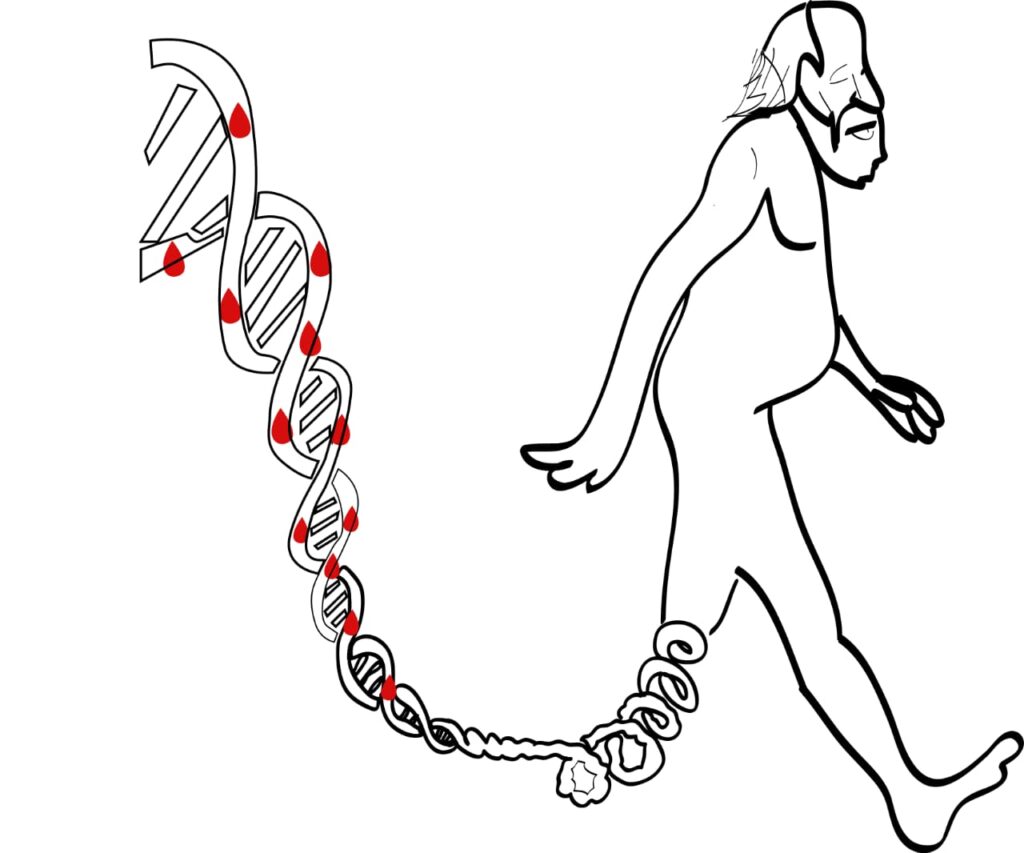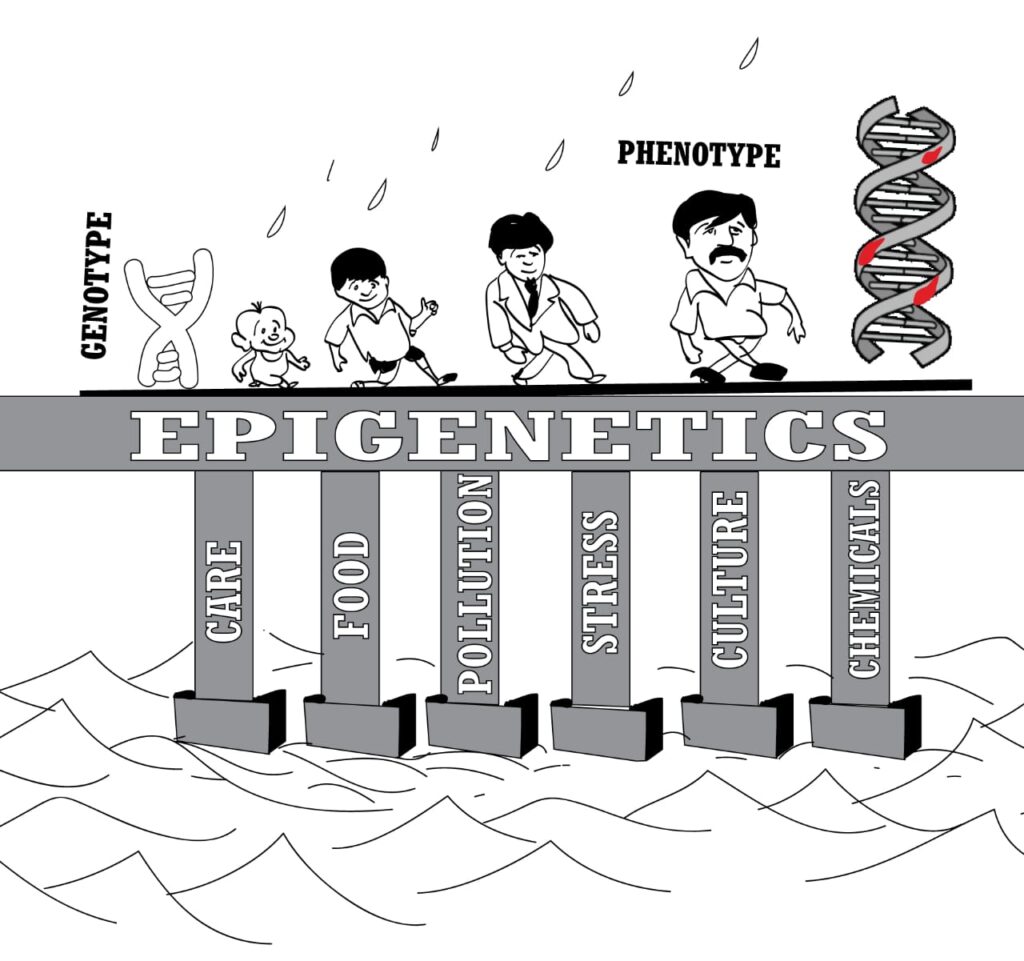Decoding human behaviour – Part 4 – How environment impacts behavior?
September 18, 2020 6:28 pmWhat is epigenetics?
When two genetically identical individuals like humans are dissimilar either physically or behaviourally or in disease proneness, epigenetics is said to be responsible for it. The dissimilarities are due to epigenetic mechanisms controlling or modifying the way genes do their work (gene expression). And it reflects the impact of environment on the living things.
Environment is constantly impinging on us right from the time the sperm penetrates the ovum. It is worth recalling grandma’s saying that mother’s emotional health during pregnancy impacts on the foetus in womb.
After birth the impact is much more. The pollutants in the air you breathe, water you drink, toxins in food, the quality of maternal/ parental care, stress of life, physical activity or lack of it, are some of the key environmental players that matter most in wellness and illness. Exposure to such factors can precipitate a chemical reaction within our body that can permanently alter the way our genes react. Once triggered, groups of molecules called methyl / acetyl group will attach itself to the control centre of a gene (chemical tag or epigenetic mark) switching it off completely. Environmental trigger and the chemical tagging following it decides when, where and which genes are to be turned on or off or modulated and fine-tuned. (the way we control the speed of fan or brightness of light using a dimmer switch) What flips the switch is epigenetics.

During transformation from a new born to adulthood and beyond, epigenetics leaves indelible as well as erasable chemical marks on the DNA, which decides how uniquely different we are from each other.
Epigenetics, is perhaps the most important and revolutionary discovery in the science of heredity since Gene. It brings to fruition what Lamarck had proposed long ago. From time immemorial man believed that both nature and nurture are important causative factors of diseases especially mental illness. Advances in epigenetics research are making clear the underlying molecular mechanism of environmental impact on living things. Depending on which organ bears the brunt of the abnormal epigenetic changes, organ specific symptoms of disease start appearing.
When Brain bears the brunt of epigenetic changes, neuronal functions may go haywire, communication within neural network which is essential for normal human behaviour could become faulty. Associated molecular and receptor changes cause abnormal behaviour with unrealistic and often illogical thought process as well as perceptual disturbance, some of the symptoms of psychiatric disorders.
‘Fore fathers and the Four Factors’
Psychiatric disorders are multifactorial in origin. Heredity definitely plays a part. The Four important factors are Environment, Gene, Epigenetics and Brain. The interaction between them and the consequent molecular changes play crucial role in mental health or ill health.
Since molecular changes in the brain responsible for psychiatric disorders cannot be demonstrated or quantified in routine clinical settings, a good number of people are not convinced about the causative role of brain and holds on to their primitive thinking. Technology to study molecular biology of mental illnesses is available but only in centres for advanced studies.
It may take time for the lab to clinic journey of such sophisticated technologies and be of use on a routine basis.
Epigenetics has generated great interest recently. Apart from determining our destiny, it throws open a new window to understand mental illness. We may be able to replace the tag of stigma with healthy epigenetic chemical tag. Future looks encouraging as new advances take place in the field of Epigenetics. And it won’t be far off when mentally sick persons will be able to lead a dignified life sans stigma. The 21st century biology may well belong to Epigenetic Revolution and pave way for de-stigmatisation of mental illness.
Take home message :
Abnormal changes in behaviour, the essential feature of mental illness, is a manifestation of disease of the Brain and epigenetics plays crucial role in its causation. Our health and life expectancy are influenced by the Four Factors, gene, epigenetics, environment and brain. Though epigenetic marks can be permanent and heritable, some of them are erasable too.
For common man, medicines are the panacea for all ills. It is time we think differently. If environmental / social stimulus can trigger a chemical change in genes that results in the onset of diseases, manipulation of environment positively should have beneficial effect in treatment of diseases, especially mental illnesses. By applying the principles of epigenetics in health care and imparting the significance of nature and nurture in medical curriculum, doctors can be trained and empowered to take a holistic approach (in contrast to the organ centred approach) which unfortunately is on the decline. Need of the time is to focus on early development and ensuring quality of family life thereby sowing the seeds of preventive psychiatry.
What best can we do to the posterity and for ourselves? The simple answer would be: Do everything that can enrich our environment and improve chances of a healthy and long life. But be aware that there will always be things we can’t control.

Epigenetics is like a bridge between one’s genetic structure and what one turns out to be. A schematic representation of the importance of Nature – Nurture interaction
Acknowledgement: Immensely thank the cartoonist, who successfully manages life though replete with adversities.
